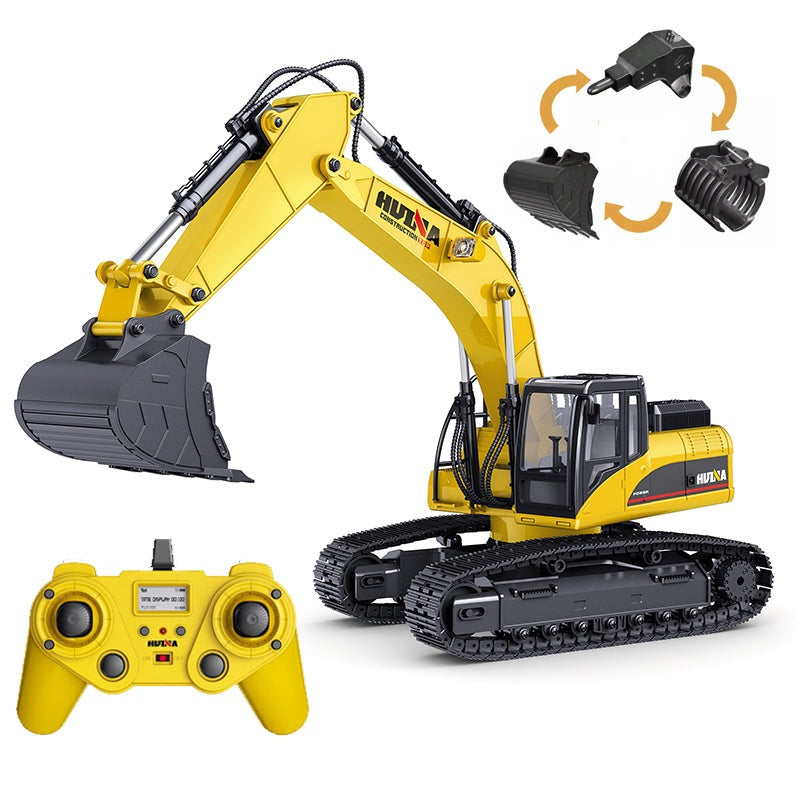Discover the Importance of Excavator in Modern Building Projects
Excavators are important devices in modern construction tasks. Their versatility permits them to carry out a vast array of jobs, from excavating and grading to demolition and site prep work. Advanced attributes, such as hydraulic add-ons and GPS, boost their capabilities and effectiveness on job sites. As the market advances, the significance of excavators grows even more. Comprehending their function can disclose understandings into the future of building techniques. What exists in advance for these devices?
The Flexibility of Excavators in Different Projects
Excavators are typically connected with large-scale building jobs, their flexibility allows them to be used in a vast range of applications, from domestic landscaping to utility upkeep. In metropolitan setups, excavators can browse tight rooms to dig structures for homes or set up drainage systems. Their capacity to execute fragile jobs makes them optimal for landscaping projects, where they can dig deep into for ponds or plant trees. On top of that, excavators play an essential duty in energy maintenance, efficiently excavating trenches for pipes or wires without interrupting surrounding locations. In agricultural applications, they aid in land cleaning and soil preparation. Moreover, their adaptability enables them to be furnished with various add-ons, boosting their capability across various jobs. This multifaceted nature of excavators not just enhances various building procedures yet likewise shows their important function in modern-day facilities growth and maintenance.
Secret Attributes and Kinds Of Excavators
The conversation on key attributes and sorts of excavators highlights the necessary characteristics that make these equipments vital in building. Different excavator kinds, each made for particular jobs, show their flexibility and efficiency across different applications. rc excavator. Comprehending these classifications and functions is vital for enhancing their use in modern building tasks
Excavator Types Summary
Excavators play an essential duty in modern-day building and construction, offering versatility and effectiveness throughout numerous jobs. These heavy machinery systems been available in numerous kinds, each tailored for specific applications. The most usual kinds consist of spider excavators, understood for their security on unequal terrain, and rolled excavators, which supply better movement on paved surfaces. Miniature excavators are favored for small tasks and tight spaces, while long-reach excavators are designed for deep digging. In addition, there are specific excavators, such as hydraulic excavators, which improve power and precision. Each type includes unique abilities, making them essential for jobs varying from excavating and grading to demolition and material handling. Comprehending these variations permits construction experts to pick the right excavator for their task requires.
Secret Features Explained
Understanding the key features of excavators boosts their reliable application in building tasks. Excavators are identified by their powerful hydraulic systems, which provide the essential pressure for digging, training, and moving materials. Their expressed arms permit a large variety of motion, facilitating specific operations in confined rooms. Furthermore, the selection of accessories, such as buckets, grapples, and augers, increases their adaptability to fulfill different job requirements. The dimension and weight of excavators also add to their security and ability to move on various surfaces. Advancements in innovation have actually led to the assimilation of GPS and automation, boosting accuracy and effectiveness in excavation jobs. These features collectively place excavators as crucial tools in modern-day building and construction.
Applications in Construction
Changing construction websites, excavators play a pivotal function across various applications, varying from household structure tasks to large-scale framework growths. These versatile devices are furnished for tasks such as digging structures, trenching for energies, and site grading. Different kinds of excavators, including spider, rolled, and mini excavators, provide particular benefits tailored to the task demands. Spider excavators stand out in harsh surfaces, while rolled excavators use mobility on smooth surface areas. Mini excavators are excellent for confined spaces, making them prominent in metropolitan settings. The efficiency and power of excavators substantially speed up construction processes, making sure prompt task conclusion. Their versatility additionally boosts their value, enabling construction teams to deal with a varied variety of difficulties successfully.
Enhancing Performance and Performance on Work Sites
Optimizing effectiveness and efficiency on work sites is a crucial goal in contemporary building and construction. Excavators play a crucial function in accomplishing this objective by enhancing various jobs. Their ability to execute numerous functions-- such as digging, grading, and training-- decreases the requirement for extra equipment, thereby saving time and resources.Moreover, excavators boost workflow by permitting faster conclusion of projects. With sophisticated features like hydraulic accessories and general practitioners modern technology, they can perform precise operations that decrease errors and revamp. This accuracy not only enhances the top quality of job but also maximizes product usage, adding to cost savings.The convenience of excavators enables them to adjust to different website conditions, making certain that projects advance smoothly despite challenges. By integrating excavators right into construction procedures, groups can significantly boost their general performance, causing timely job conclusion and increased earnings.
Safety Advantages of Using Excavators
Excavators considerably boost security on building sites with boosted operator visibility and reduced manual work dangers. By supplying drivers with a clear sight of their environments, excavators aid to avoid injuries and mishaps. Furthermore, the machinery lessens the requirement for workers to engage in dangerous hands-on jobs, additionally advertising a more secure job setting.
Boosted Driver Presence
Although building and construction websites can be disorderly and loaded with possible dangers, boosted driver exposure plays an essential function in ensuring safety and security when using excavators. Modern excavators are designed with big, unhampered home windows and purposefully positioned mirrors, enabling operators to maintain a clear sight of their environments (rc excavator). This improved exposure is vital for finding pedestrians, other equipment, and different challenges, significantly decreasing the threat of crashes. In addition, numerous excavators include advanced modern technology, such as cams and sensors, to supply drivers with added viewpoints, additionally enhancing recognition. The capacity to see more clearly not just aids in efficient operation yet additionally promotes a more secure workplace, making it simpler for drivers to navigate complex construction sites without endangering safety requirements
Decreased Guidebook Labor Threats
When hands-on labor is minimized through using excavators, many safety and security benefits arise, considerably boosting the health of construction workers. Excavators minimize the physical strain related to heavy lifting and repeated jobs, efficiently reducing the threat of bone and joint injuries. By automating procedures such as digging, grading, and moving products, they enable workers to preserve a much safer range from possible hazards. In addition, excavators are furnished with innovative security attributes, such as rollover defense systems and enhanced operator ergonomics, which even more protect employees on site. The result is a considerable decrease in workplace accidents and injuries, causing boosted efficiency Get More Info and morale among building teams. Eventually, the adoption of excavators adds to a much safer and more reliable building atmosphere.
Excavators in Earthmoving and Site Preparation
In contemporary building, a substantial section of earthmoving and website prep work tasks counts on the effectiveness and flexibility of excavators. These makers are designed to handle various soil types and surface, making them essential for grading, excavating, and trenching activities. Their hydraulic arms can be furnished with different attachments, such as augers and buckets, permitting operators to tailor their strategy based upon certain project requirements.Excavators succeed at relocating big quantities of earth quickly and successfully, which accelerates the total building and construction timeline. They can browse limited areas and challenging websites where conventional devices might struggle, boosting productivity. In addition, the accuracy of excavators warranties that site preparation complies with strict specifications, lessening the danger of mistakes that might result in expensive rework.
The Function of Excavators in Demolition Tasks
Excavators play an important function in demolition tasks, as they have the power and agility needed to take apart frameworks successfully. Equipped with numerous attachments such as hydraulic breakers, shears, and grapples, these makers can adapt to various demolition needs, whether for tiny structures or large commercial websites. Their adaptability makes it possible for operators to tackle complicated projects while maintaining internet safety and security and precision.In addition to their demolition capacities, excavators help with particles elimination, making certain that work websites continue to be orderly and secure. By damaging down frameworks right into workable items, they enable for streamlined clearing up and recycling of products, straightening with modern sustainability efforts.Moreover, excavators can access tight spaces and browse unequal terrain, making them important in metropolitan demolition jobs. Overall, their robust layout and multifunctionality make excavators a critical property in the demolition stage of building and construction, contributing significantly to task timelines and performance.


Future Patterns in Excavator Modern Technology and Usage
As the building sector develops, improvements in excavator technology are poised to transform their usage and performance significantly. One substantial pattern is the assimilation of automation and fabricated knowledge, enabling excavators to run with minimal human treatment. This change will boost precision in jobs such as grading and trenching, decreasing human error and boosting productivity.Additionally, the increase of hybrid and electric excavators is shaping an extra lasting building setting, decreasing carbon discharges and gas prices. Boosted telematics systems are also arising, allowing real-time monitoring of machine efficiency and upkeep needs, which can lead to much better functional performance and longer equipment lifespan.Moreover, advancements in accessory modern technology are expanding the adaptability of excavators, enabling them to do a wider variety of tasks. The mix of these trends shows a future where excavators are smarter, greener, and a lot more adaptable, eventually improving construction job dynamics.
Regularly Asked Inquiries
Exactly How Do Excavators Contrast to Various Other Construction Equipment?
Excavators, identified by their convenience and power, succeed in excavating and earthmoving contrasted to other machinery. Their capacity to do various tasks, consisting of training and demolition, makes them important in building jobs, improving general effectiveness.

What Is the Typical Life Expectancy of an Excavator?
The ordinary lifespan of an excavator normally varies from 7,000 to 10,000 operating hours, depending on maintenance, usage conditions, and version. Proper care can prolong this lifespan, making sure reference peak performance throughout its functional years.
How Are Excavators Maintained for Ideal Efficiency?
Excavators need routine maintenance for peak efficiency, consisting of regular assessments, liquid checks, filter replacements, and prompt repair work. Implementing a precautionary maintenance routine helps extend their lifespan and guarantees reliable operation in various building and construction environments.
What Are the Expenses Related To Leasing vs. Getting an Excavator?
The expenses related to buying an excavator versus leasing vary substantially. Renting offers lower upfront costs but can collect with time, while buying requires a substantial initial financial investment, however offers long-term savings and possession ownership advantages.
What Training Is Needed to Operate an Excavator?
Running an excavator needs specialized training, usually consisting of safety and security protocols, equipment procedure methods, and environmental awareness. Qualification programs usually mandate practical experience, making it possible for operators to take care of different jobs successfully while ensuring conformity with industry guidelines. The most common types include spider excavators, understood for their security on uneven surface, and rolled excavators, which provide better movement on smooth surfaces. Tiny excavators are favored for limited areas and small-scale projects, while long-reach excavators are made for deep excavating. Furthermore, there are specialized excavators, such as hydraulic excavators, which improve power and accuracy. Various types of excavators, including crawler, wheeled, and mini excavators, supply specific advantages tailored to the project requirements. Crawler excavators stand out in rough terrains, while rolled excavators provide wheelchair on paved surface areas.